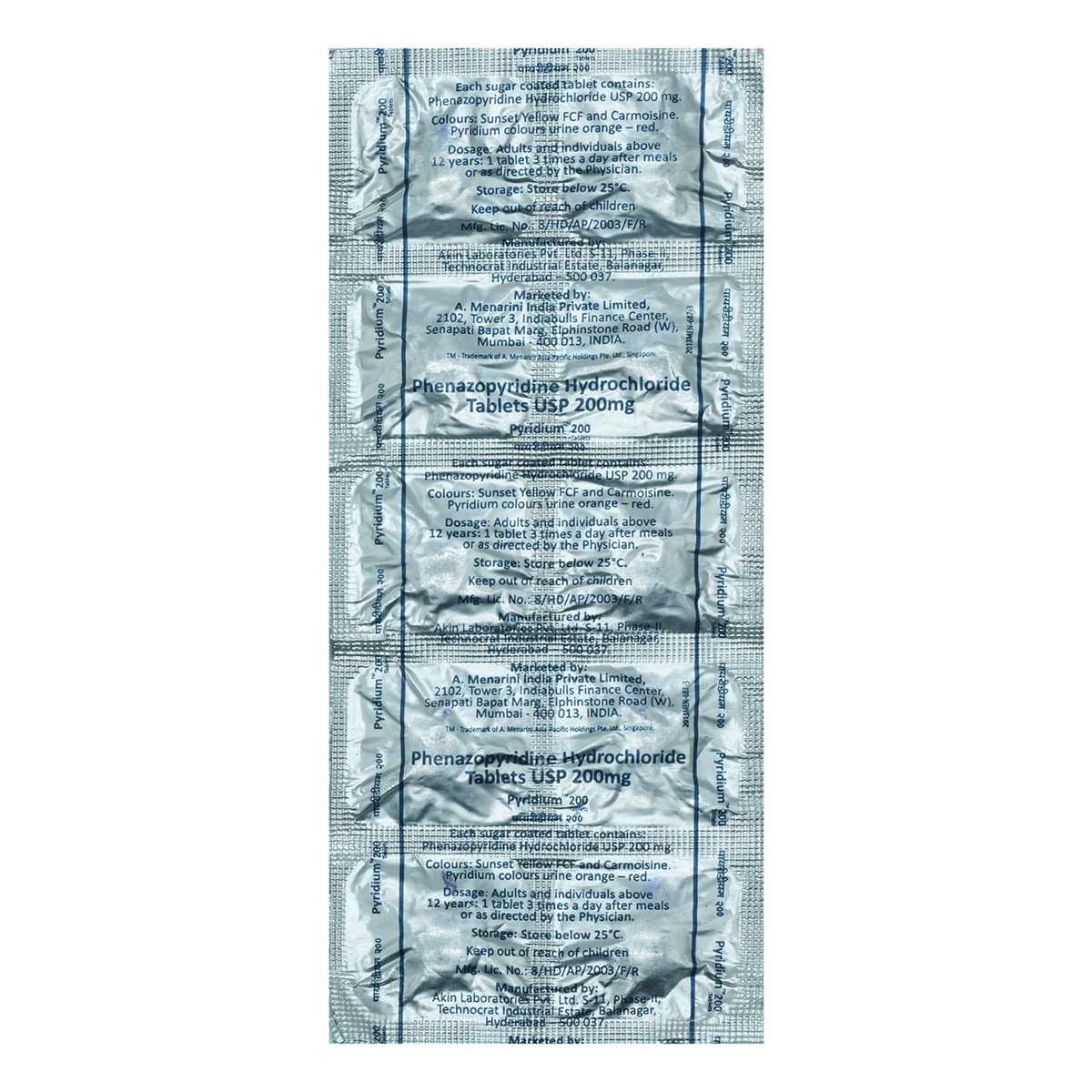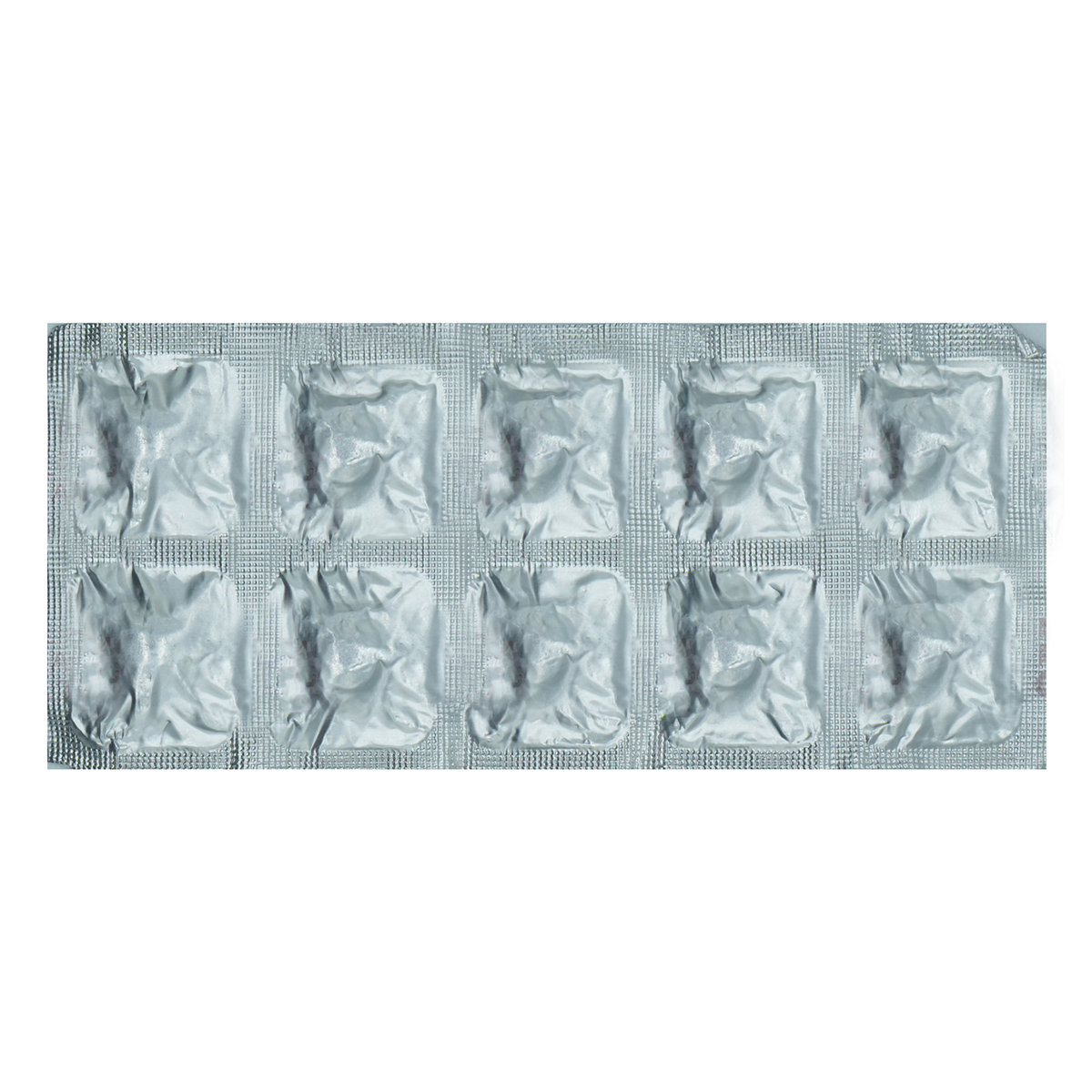Pyridium 200 Tablet 10's
MRP ₹151.5
(Inclusive of all Taxes)
₹22.7 Cashback (15%)
Provide Delivery Location
Online payment accepted
 Prescription drug
Prescription drugWhats That
Composition :
Manufacturer/Marketer :
Consume Type :
Expires on or after :
Return Policy :
About Pyridium 200 Tablet
Pyridium 200 Tablet belongs to a group of medicines called analgesics indicated for the relief of pain, burning sensation, urgency/frequency or discomfort due to irritation of the lower urinary tract's mucosal lining caused by infections, surgery, trauma, the passage of catheters or endoscopic procedures.
Pyridium 200 Tablet contains ‘Phenazopyridine’ that exerts an analgesic effect on the urinary tract's mucosa by blocking the release of chemical messengers that cause pain, thereby providing relief from pain, burning sensation, frequency, and urgency.
You are advised to take Pyridium 200 Tablet for as long as your doctor has prescribed it for you, depending on your medical condition. In some cases, you may experience certain common side-effects such as headache, changes in urine colour, diarrhoea, nausea, and vomiting. Most of these side-effects do not require medical attention and will resolve gradually over time. However, you are advised to talk to your doctor if you experience these side-effects persistently.
Stop taking Pyridium 200 Tablet and consult your doctor immediately if you observe yellowish colouring of the skin or eye. Consult your doctor if you are pregnant or breastfeeding. Pyridium 200 Tablet may cause dizziness, so drive only if you are alert. Pyridium 200 Tablet is not recommended for children as safety has not been established. Avoid consuming alcohol with Pyridium 200 Tablet as it could lead to increased dizziness. Keep your doctor informed about your health condition and medicines to rule out any side-effects.
Uses of Pyridium 200 Tablet
Directions for Use
Key Benefits
Pyridium 200 Tablet belongs to a group of medicines called analgesics. Pyridium 200 Tablet is indicated for the relief of pain, burning sensation, urgency, frequency, or discomfort due to irritation of the lower urinary tract's mucosal lining caused by infections, surgery, trauma, the passage of catheters, or endoscopic procedures. Pyridium 200 Tablet is excreted in the urine, where it exerts an analgesic effect on the mucosa of the urinary tract by blocking the release of chemical messengers that cause pain, thereby provides relief from pain, burning sensation, frequency, and urgency.
Storage
Drug Warnings
Do not take Pyridium 200 Tablet if you are allergic to any of its contents; if you have renal insufficiency, severe liver problems, and G-6-PD deficiency. Inform your doctor if you have gastrointestinal disturbances, heart problems, neuromuscular problems, diabetes, and hepatitis. Consult your doctor if you are pregnant or breastfeeding. Pyridium 200 Tablet may cause dizziness, so drive only if you are alert. Pyridium 200 Tablet is not recommended for children as safety has not been established. Avoid consuming alcohol with Pyridium 200 Tablet as it could lead to increased dizziness. Stop taking Pyridium 200 Tablet and consult your doctor immediately if you observe yellowish colouring of the skin or eye. Pyridium 200 Tablet may cause discolouration of urine, faeces, body fluids and soft contact lens.
Drug-Drug Interactions
Drug-Drug Interactions
Login/Sign Up
Taking Pyridium 200 Tablet with etidocaine can increase the risk of methemoglobinemia(a blood disorder in which too little oxygen is delivered to the cells).
How to manage the interaction:
Co-administration of Pyridium 200 Tablet with Etidocaine can possibly result in an interaction, but it can be taken if your doctor has advised it. However, if you experience symptoms such as gray discoloration of the skin, nausea, headache, dizziness, lightheadedness, fatigue, shortness of breath, rapid or shallow breathing, a rapid heartbeat, palpitation, anxiety, or confusion, consult your doctor immediately. Do not stop using any medications without a doctor's advice.
Taking Pyridium 200 Tablet with ropivacaine can increase the risk of methemoglobinemia(a blood disorder in which too little oxygen is delivered to the cells).
How to manage the interaction:
Taking Pyridium 200 Tablet with Ropivacaine together can possibly result in an interaction, but it can be taken if your doctor has advised it. However, if you experience symptoms such as gray discoloration of the skin, nausea, headache, dizziness, lightheadedness, fatigue, shortness of breath, rapid or shallow breathing, a rapid heartbeat, palpitation, anxiety, or confusion, consult your doctor immediately. Do not discontinue any medications without first consulting your doctor.
Using Pyridium 200 Tablet together with mipomersen can increase the risk of liver problems.
How to manage the interaction:
Although there is a drug interaction between Pyridium 200 Tablet with mipomersen, but can be taken together if prescribed by a doctor. If you experience fever, chills, joint pain, swelling, unusual bleeding, bruising, skin rash, itching, loss of appetite, fatigue, nausea, vomiting, abdominal pain, dark urine contact doctor immediately. Do not discontinue medications without consulting the doctor.
Taking Pyridium 200 Tablet with tetracaine can increase the risk of methemoglobinemia(a blood disorder in which too little oxygen is delivered to the cells).
How to manage the interaction:
There may be a possibility of interaction between Pyridium 200 Tablet and Tetracaine, but it can be taken if prescribed by a doctor. However, if you experience symptoms such as gray discoloration of the skin, nausea, headache, dizziness, lightheadedness, fatigue, shortness of breath, rapid or shallow breathing, a rapid heartbeat, palpitation, anxiety, or confusion, consult your doctor immediately. Do not discontinue any medications without consulting your doctor.
Taking Pyridium 200 Tablet with bupivacaine can increase the risk of methemoglobinemia,(a blood disorder that affects how red blood cells deliver oxygen throughout your body).
How to manage the interaction:
Although taking bupivacaine and Pyridium 200 Tablet together can result in an interaction, it can be taken if a doctor has advised it. However, if you experience symptoms such as gray discoloration of the skin, abnormal blood coloration, nausea, headache, dizziness, lightheadedness, fatigue, shortness of breath, rapid or shallow breathing, a rapid heartbeat, palpitation, anxiety, or confusion, consult the doctor immediately. Do not discontinue any medications without consulting a doctor.
Taking Pyridium 200 Tablet with levobupivacaine can increase the risk of methemoglobinemia(a blood disorder in which too little oxygen is delivered to the cells).
How to manage the interaction:
Although there is a drug interaction between Pyridium 200 Tablet and levobupivacaine but can be taken together if advised by a doctor. If experience nausea, headache, dizziness, lightheadedness, fatigue, shortness of breath, fast breathing, fast heartbeat, anxiety and confusion contact doctor immediately. Do not discontinue medications without consulting a doctor.
Using Pyridium 200 Tablet together with lomitapide can increase the risk of liver problems.
How to manage the interaction:
Although taking lomitapide and Pyridium 200 Tablet together can possibly result in an interaction, it can be taken if your doctor has advised it. However, if you experience symptoms such as gray discoloration of the skin, nausea, headache, dizziness, lightheadedness, fatigue, shortness of breath, rapid or shallow breathing, a rapid heartbeat, palpitation, anxiety, or confusion, consult your doctor immediately. Do not discontinue any medications without first consulting your doctor.
Taking Pyridium 200 Tablet with mepivacaine can increase the risk of methemoglobinemia(a blood disorder in which too little oxygen is delivered to the cells).
How to manage the interaction:
Taking Pyridium 200 Tablet with Mepivacaine together can possibly result in an interaction, but it can be taken if your doctor has advised it. However, if you experience symptoms such as gray discoloration of the skin, nausea, headache, dizziness, lightheadedness, fatigue, shortness of breath, rapid or shallow breathing, a rapid heartbeat, palpitation, anxiety, or confusion, consult your doctor immediately. Do not discontinue any medications without consulting your doctor.
Taking Pyridium 200 Tablet with ketoconazole increases the risk of liver problems.
How to manage the interaction:
Although taking Ketoconazole and Pyridium 200 Tablet together can result in an interaction, it can be taken if a doctor has prescribed it. However, if you fever, chills, joint pain or swelling, unusual bleeding or bruising, skin rash, itching, fatigue, lack of appetite, nausea, vomiting, abdominal pain, dark urine, light stools, and/or yellowing of the skin or eyes, consult a doctor immediately. Do not stop using any medications without a doctor's advice.
Using Pyridium 200 Tablet together with leflunomide can increase the risk of liver problems.
How to manage the interaction:
Co-administration of Leflunomide with Pyridium 200 Tablet can possibly result in an interaction, but it can be taken if your doctor has advised it. If you have any of these symptoms, it's important to contact your doctor right away: fever, chills, joint pain, swelling, bruising, skin rash, itching, loss of appetite, fatigue, nausea, vomiting, abdominal pain, dark colored urine, liver damage, or bleeding. Do not stop using any medications without first talking to your doctor.
Drug-Food Interactions
Drug-Food Interactions
Login/Sign Up
Diet & Lifestyle Advise
- Drink plenty of fluids as it helps to maintain bladder health.
- Avoid soda, alcohol, artificial sweeteners, and coffee.
- Follow a plant-based diet.
- Maintain a healthy weight. Exercise regularly.
- Pelvic floor muscles can help in strengthening bladder muscles.
- Use the bathroom whenever needed. Avoid holding in the pee for too long.
- Wear cotton loose-fitting undergarments as it prevents bacterial growth.
- Avoid smoking.
Side Effects of Pyridium 200 Tablet
- Vomiting
- Headache
- Dizziness
- Nausea
- Diarrhoea
- Changes in urine colour
- Upset stomach
Habit Forming
Therapeutic Class
All Substitutes & Brand Comparisons
Author Details
We provide you with authentic, trustworthy and relevant information
Drug-Diseases Interactions
Drug-Diseases Interactions
Login/Sign Up
FAQs
Drug-Drug Interactions Checker List
- CIPROFLOXACIN
Special Advise
- Pyridium 200 Tablet might interfere with urine tests. Inform the person doing the tests that you are taking Pyridium 200 Tablet .
- Pyridium 200 Tablet may interfere with laboratory tests using colourimetric, photometric or fluorometric analysis methods.
Disease/Condition Glossary
Pain in the urinary tract: Pain is a symptom triggered by the nervous system, causing uncomfortable sensations in the body. Pain may be dull or sharp. It might be constant or may come and go. The tolerance level of pain might vary from person to person. Pain in the urinary tract could occur due to infections, surgery, trauma, catheter passage, or endoscopic procedures. Urinary tract infections can cause pain during urination, burning sensation during urination, increased frequency, and increased urge to pass urine.

Have a query?
Alcohol
Safe if prescribed
Avoid consumption of alcohol while taking Pyridium 200 Tablet as it may cause increased dizziness.
Pregnancy
Consult your doctor
Pyridium 200 Tablet belongs to pregnancy category B. Please consult your doctor if you have any concerns regarding this; your doctor will prescribe only if the benefits outweigh the risks.
Breast Feeding
Consult your doctor
It is unknown whether Pyridium 200 Tablet passes into breastmilk. Please consult your doctor before taking Pyridium 200 Tablet . Your doctor will decide whether Pyridium 200 Tablet can be taken by breastfeeding mothers or not.
Driving
Safe if prescribed
Pyridium 200 Tablet may cause dizziness. Do not drive or operate machinery unless you are alert.
Liver
Consult your doctor
Pyridium 200 Tablet should be used with caution in patients with liver disease only when prescribed by a doctor.
Kidney
Consult your doctor
Pyridium 200 Tablet should be used with caution in patients with kidney insufficiency/disease only when prescribed by a doctor.
Children
Safe if prescribed
Pyridium 200 Tablet is not recommended for children as the safety and effectiveness were not established.







_0.jpg?tr=q-85)

